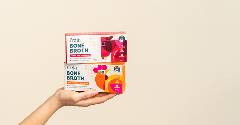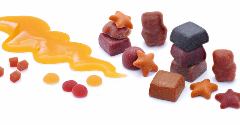News
High-fibre launches capture consumer interest in gut health
24 Feb 2023
Amid new research into the gut-brain axis, high-fibre-based launches – from frozen broccoli to granola – are capturing consumer calls for products that support vitality, mental health, and gut health.
As manufacturers explore the link between mind and nutrition, vitality and gut health are areas producers are exploring to formulate in their product launches and expansion. However, research is required before products can gain acceptance and entry into the marketplace.
The relationship between food and gut health
“'Gut health' refers to the functioning of our entire digestive tract,” says Jon Walsh, co-founder and CEO of granola producer, Bio&Me.

“Gut health is still a pretty new area of research in the science world. It's only in the last decade or so that scientists discovered the community of trillions of bacteria living in our gut. This revolutionised how we look after our health and wellbeing, unlocking huge power and potential.”
Around 70% of consumers’ immune systems lie along their digestive tract and trillions of bacteria that live there outnumber human cells, as human cells can’t digest dietary fibre. Manufacturers can communicate the importance of gut health by detailing these crucial functions.
Ramping up gut-brain axis awareness
The latest 2023 insights from market intelligence provider Mintel reveal that new research and patents on the gut-brain axis are expected to generate opportunities in food and drink. Specifically, this new understanding will highlight how the digestive health benefits of probiotics, prebiotics and postbiotics can support cognitive health.
Beyond plant-based items like fruit, vegetables and legumes, popular and accepted ingredients deemed ‘energising’, like caffeine, will see manufacturers formulate with them and highlight their benefits for the brain. In Vietnam, Nestlé Milo Mindvibe is aimed at the teenage demographic and has been formulated with green tea, taurine, zinc and B vitamins to ‘provide energy and focus’.
Achieving mental and emotional wellbeing via food and drink is sought after by consumers as they want products that help their focus and productivity. Increasingly, consumers search for food and drink that influence their cognitive capacity, manage stress levels, and optimise brain function.
Interest in functional diets and particularly brain functioning is prevalent, with Mintel revealing that 45% of consumers in Brazil and 42% in Argentina agree: “I would like a diet to help maintain healthy brain function”. In response, manufacturers are exploring how they can design food and drink to help consumers improve their mental performance.
 (1).png) Bio&Me Granolas Range | © Bio&Me
Bio&Me Granolas Range | © Bio&Me
Focus on fibre
Fruit and vegetables are expected to appear in larger quantities in new launches to boost cognitive health. Marketing messages and claims will centre on their presence as a source of increased energy and mood enhancement. New Zealand frozen food brand Countdown Broccoli & Cauliflower promotes itself as a good source of fibre for healthy digestion and folate to reduce tiredness and fatigue.
Bio&Me recommends aiming for 30 different plant-based foods weekly for optimal gut health. “They’re important because they produce hormones, different vitamins and communicate with our brain,” Walsh adds.
Producers hoping to leverage consumer interest in vitality and gut health claims can emphasise the inherent nutrition within plant-based ingredients and how this connects to cognitive health. Bio&Me aims to communicate the benefits of plant-based foods, specifically how consuming dietary fibre from a diverse range of sources is good for gut health. Plant-based foods, including fruits, vegetables, wholegrains, legumes, nuts and seeds, feed bacteria.
From nature to bionature-inspired, technology also features in the growing vitality and gut health space. Bioscience and artificial intelligence (AI) developer Brightseed has launched a dietary hemp fibre for food and drinks to support gut health. The product, Brightseed Bio, originates from upcycled hemp hulls. It contains two bioactive compounds designed to optimise bioactive content and support gut barrier integrity.
Transparency wins
“Consumers want gut health brands to be transparent,” says Walsh. They want products to have scientifically-backed claims and taste good.
 (2).png) Bio&Me Prebiotic Yoghurt Range | © Bio&Me
Bio&Me Prebiotic Yoghurt Range | © Bio&Me
“There is a scary number of food companies that have never consulted a nutrition expert, despite making some pretty outlandish health claims about their products, most of which breach European Food Safety Agency (EFSA) regulations,” says Walsh.
Working towards wellbeing
To build consumer confidence, brands must prove that their range of natural and functional ingredients deliver their cognitive health claims and comply with regulations. Manufacturers must therefore focus on formulating with clinically proven and natural nutrients.
As more ingredients gain acceptance among consumers, it will be easier for manufacturers to produce products with clinically proven nutrients that support cognitive and psychological functions, such as magnesium, B vitamins and zinc to gain their trust.
Formulations with bioactives impact overall vitality and gut health, but it is not just about consumers’ digestive system. “Good gut health is linked to better overall health, including your heart, skin and brain,” says Walsh. “Looking after your gut can also help with weight management, better mental health and reduce the risk of diabetes, heart disease and autoimmune diseases,” Walsh adds.
Related news

Bone broth: From old-fashioned to en vogue
24 Nov 2025
OXO’s entry into bone broth has turned the spotlight on this small but high-performance category – and there is still scope for growth, especially in the area of GLP-1 support.
Read more
Matcha madness: Why green is this year’s hottest colour
19 Nov 2025
Five years ago, it was a struggle to find matcha outside of Japan. Now it seems to be popping up everywhere, from coffee shops to supermarket shelves.
Read more
How younger consumers are redefining ingredient choices and rejecting brand loyalty
18 Nov 2025
Gen Z and millennial consumers’ preferences for transparency, functionality, and purpose are “redefining the very nature of consumption itself”, says SPINS.
Read more
Hybrid formats and flexible positioning to disrupt category norms in 2026
17 Nov 2025
Trend forecasters expect food and drink to move more fluidly across occasions, functions, and formats as consumers seek versatility, novelty, and convenience.
Read more
Empowering innovation in fortification and colouration
13 Nov 2025
Divi’s Nutraceuticals offers a large portfolio of innovative, high-quality ingredients for foods, beverages, and supplements, with bespoke solutions and expert support for product success.
Read more
Predictive maintenance redefines powder mixing reliability
13 Nov 2025
Mill Powder Tech's smart control systems harness real-time data to help the food and biotech sectors achieve zero downtime and smarter output, alongside rigorous GMP standards and ambitious ESG goals.
Read more
From fruit to functional solutions: Meet Paradise Fruits at Fi Europe in Paris
13 Nov 2025
Paradise Fruits Solutions and Paradise Fruits Health will showcase their combined expertise in delivering innovative, fruit-based solutions to the food and beverage industry at the upcoming Fi Europe trade show (2-4 December 2025, Paris).
Read more
Danone highlights digestive health as potential ‘tipping point’ for food industry
13 Nov 2025
Danone is betting on a food industry “tipping point” that will bloat the market for healthy products, particularly those related to gut health.
Read more
Bord Bia presents Irish dairy ingredient suppliers at Fi Europe
6 Nov 2025
Dairygold Co-operative Society, The Carbery Group, and Ornua Co-operative: Meet with sustainable producers of Irish dairy ingredients at Food ingredients Europe 2025, Hall 7.2 Stand M18.
Read more
Ingredient quantities mislabelled on popular protein bars, independent tests show
5 Nov 2025
Some popular protein bars contain more fat, carbs, and/or sugars than claimed on their labels, independent nutrition testing reveals.
Read more